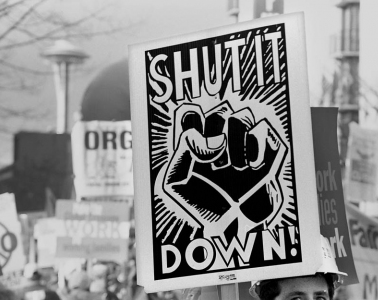Bhaskar Sunkara kicked up a bit of a storm when he first wrote about ‘anarcho-liberalism’ in 2011. Sunkara wrote about this odd term as an extension of the politics of the New Left. Specifically the anti-globalization movement of the late 1990s and early 2000s. And when he used the term, Sunkara called to mind two things: first, a rejection of the mass working class institutions and politics of the left, and second, ‘revolutionary’ critique and action from people and small groups.
Let me narrow this down a bit in a way that readers might apply to their local situations. Anarcho-liberalism often amounts to a kind of knee-jerk cynicism and opposition toward government, especially at the local level. And it lacks any serious plan to build a movement to take power in the interests of the working class.
Insofar as anarcho-liberalism allows for an alternative, it falls back on NGOs, non-profits, or ‘mutual aid.’ And these are the best options. At its worst, it fails to go beyond ‘pestering’ local officials with no deeper goal.
In short, it’s a mess. And it has its backers in Iowa City.
Let’s talk a bit about that.
Anarcho-Liberalism in Iowa City
Perhaps more than anywhere else, the New Left made its mark on Iowa City. For decades, Iowa City has hosted a vibrant activist scene, which produces a uniquely college town politics. The murky origins of that activist scene produced a wide range of non-profit orgs that provide services to many groups.
These orgs make Iowa City a better place to live. I’m even a board member of one local non-profit.
But these orgs came about, in part, due to a rejection of working class politics. A collection of mostly white, mostly well educated, and relatively well-off progressives created charitable orgs. These orgs cannot address the structural issues under our city’s problems. At best, they alleviate symptoms.
By their nature, non-profits solve only narrowly tailored problems rather than structural issues. They cannot create enduring working class politics.
However, much of the Iowa City left hold loftier aims for our non-profits and mutual aid groups. Some think these groups can replace local politics. Some spring forward as a new Pied Piper. Others join along the way.
Anarcho-Liberalism is Broad
So, who makes up the ‘anarcho-liberal’ faction in Iowa City?
Lots of people, as it turns out. I think a broad range of Iowa City political actors accept it. At least in part. As a basic approach to local politics and action, it unites even people who bitterly fight against each other.
Consider, for example, the idea that non-profits, especially 501c3 orgs, should deliver social services. And along with it, the idea that less formal citizens’ groups – mutual aid or unregistered orgs – should deliver social services. Defenders of these ideas fight bitterly with one another – the former accusing the latter of staying too small to be relevant and the latter accusing the former of being too wedded to ‘the system.’
Despite these fights, the same political vision unites the two ideas. What’s that vision? Reject mass, democratic working class organizing for state power. Support instead a motley crew of petty bourgeois service providers.
And to put this into local electoral terms, most city council members in Iowa City are, to some degree or another, part of an anarcho-liberal faction. Mandi Remington is even running in 2023 with a campaign pretty explicitly based on anarcho-liberalism, promoting a ‘coalition of non-profits, both formal and informal’ vision of how politics should work.
Housing and Poverty in Iowa City
Finally, to make this a bit more concrete, I’ll finish with a word on housing and poverty, two critical material issues in Iowa City.
With housing, Iowa City hosts a small army of non-profits that do excellent work. I’ve written previously about the work Inside Out Reentry does on housing people returning from incarceration and about the work Shelter House does on reducing homelessness.
All this work is fine, but it will never solve our deep, political housing issues. For that, we have to develop solutions like mixed income public housing. And to do that, we have to form a working class political coalition to fight the role of finance capital in the housing system. We’ll never, ever get there with non-profits. We can do that only through political organizing.
On poverty, Iowa City, for awhile, had a mutual aid group. And it did good work. But even at its height, it was nowhere near the size of even a fairly small non-profit. It could’ve gotten bigger, but it never had even a prayer of serving as a substitute for poverty relief organized by working-class political action.
Mutual aid simply isn’t up for that kind of task at that kind of scale. A better way to do mutual aid would be through a local activist org committed to deeper working-class organizing, serving only as one small part of a larger org.
Keeping these things in mind help us understand, much better, the need to move beyond utopian projects disconnected from the material situation on the ground and toward a working class org that can achieve socialist democracy.
